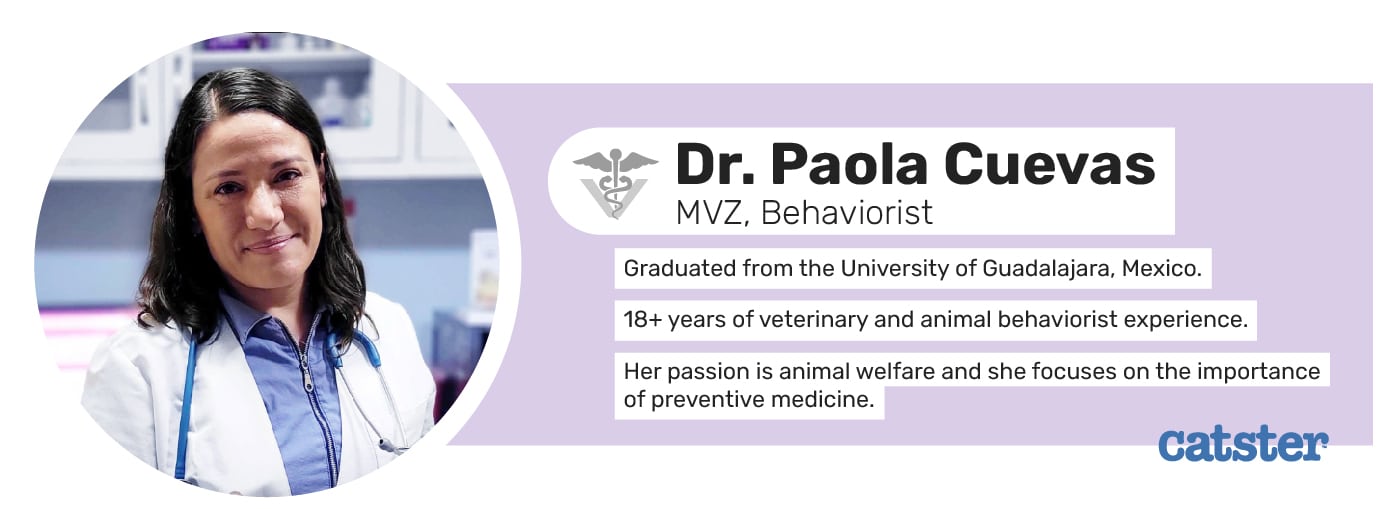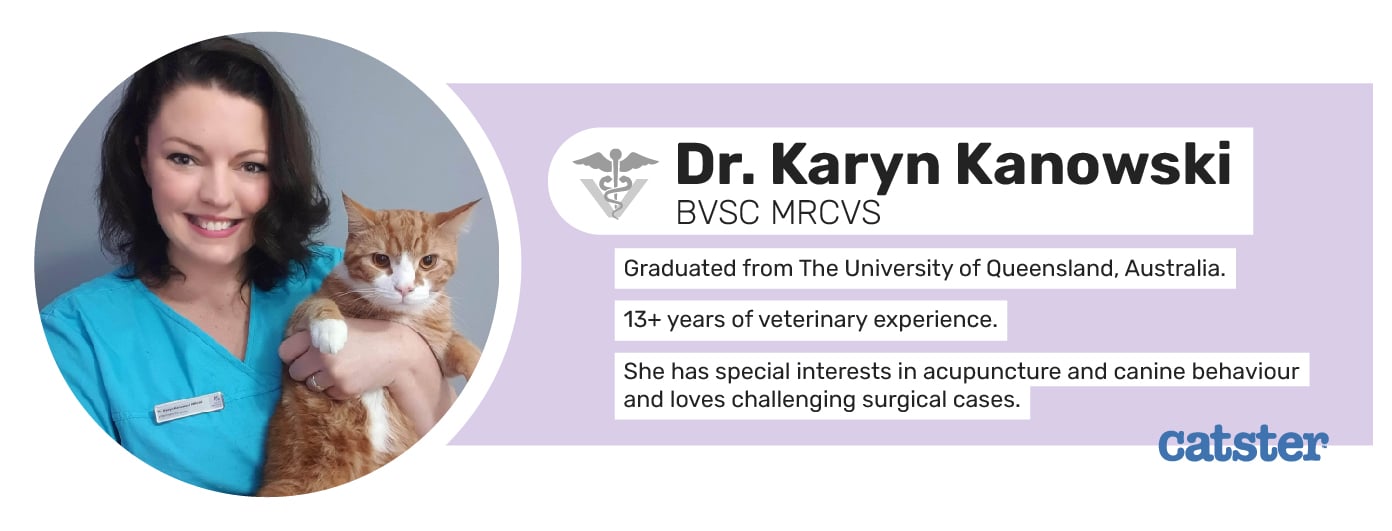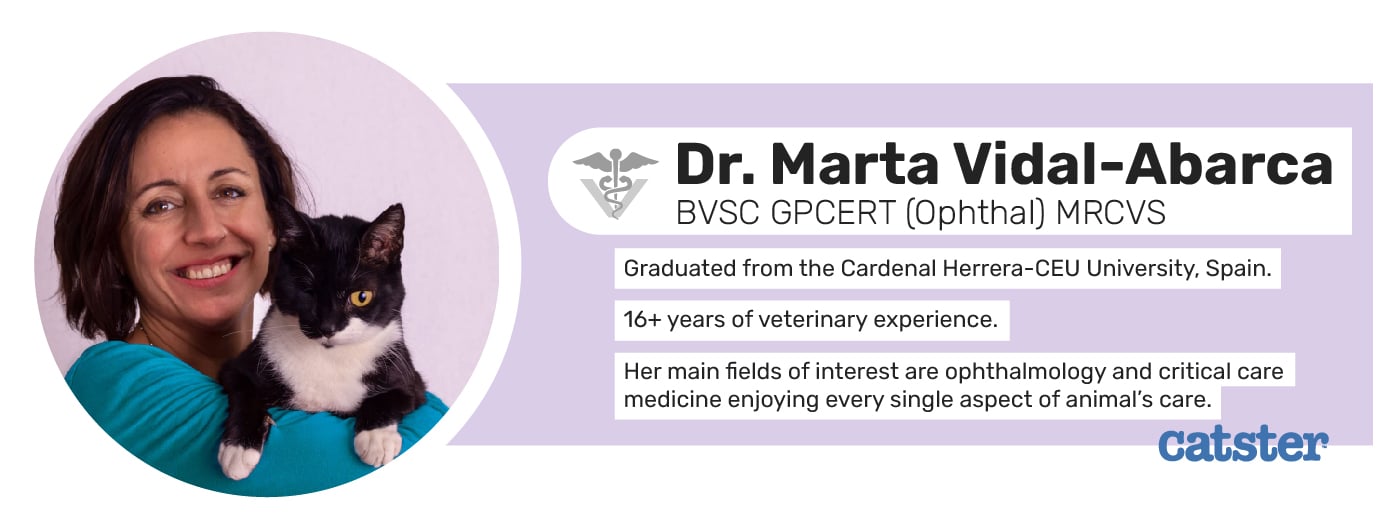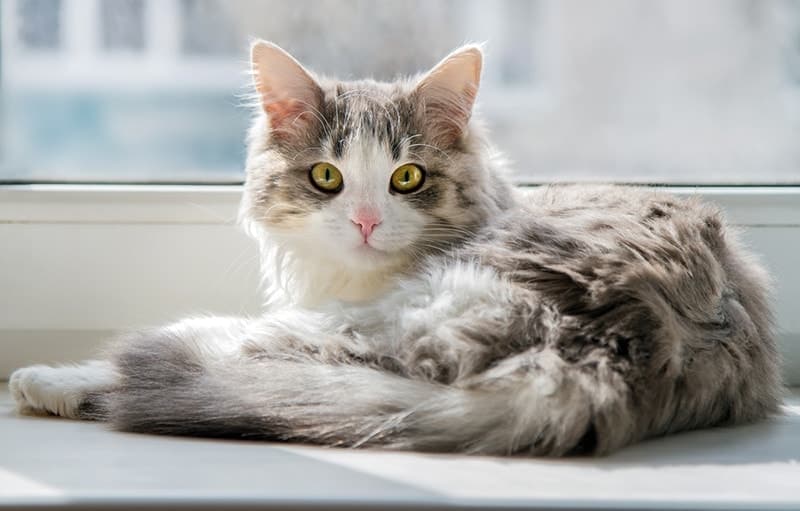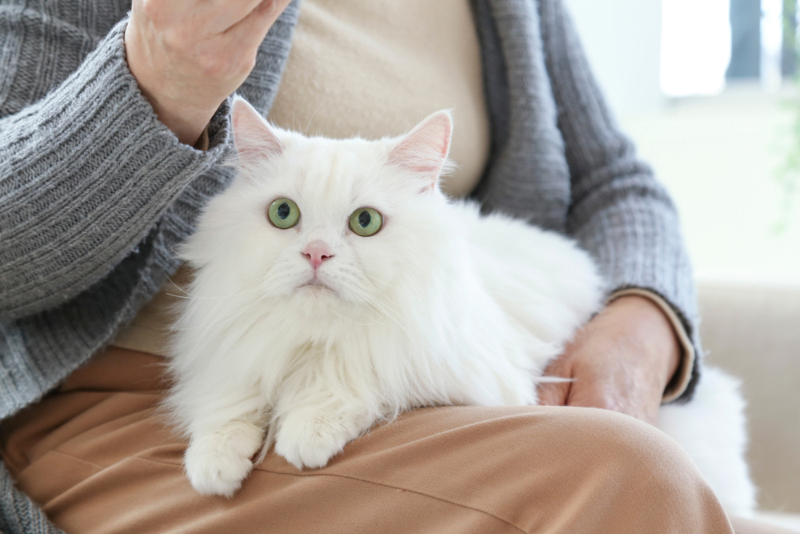
Cat ownership can be hard sometimes. To our dismay, cats don’t talk, and every animal has unique, individual wants, needs, and preferences. Thank the feline gods we have vets!
Catster’s vet team came together and put forth the 11 senseless cat owner sins to outline some things that cat owners should never do, attempt, or even think about doing. No matter what social media or your neighborhood cat lady says! These acts are dangerous and could cause harm to your cat or, in rare cases, lead to death.
Click to skip ahead:
First up, meet our team of global vets!
Dr. Paola Cuevas – Catster’s Senior In-house Veterinarian
Dr. Amanda Charles – Catster Veterinarian Editor
Dr. Karyn Kanowski – Catster Veterinarian Editor
Dr. Lorna Whittemore – Catster’s Senior Veterinarian Editor
Dr. Luqman Javed – Catster In-House Veterinarian
Dr. Maja Platisa – Catster In-House Veterinarian
Dr. Marta Vidal-Abarca- Catster In-House Veterinarian
The 11 Senseless Cat Owner Sins
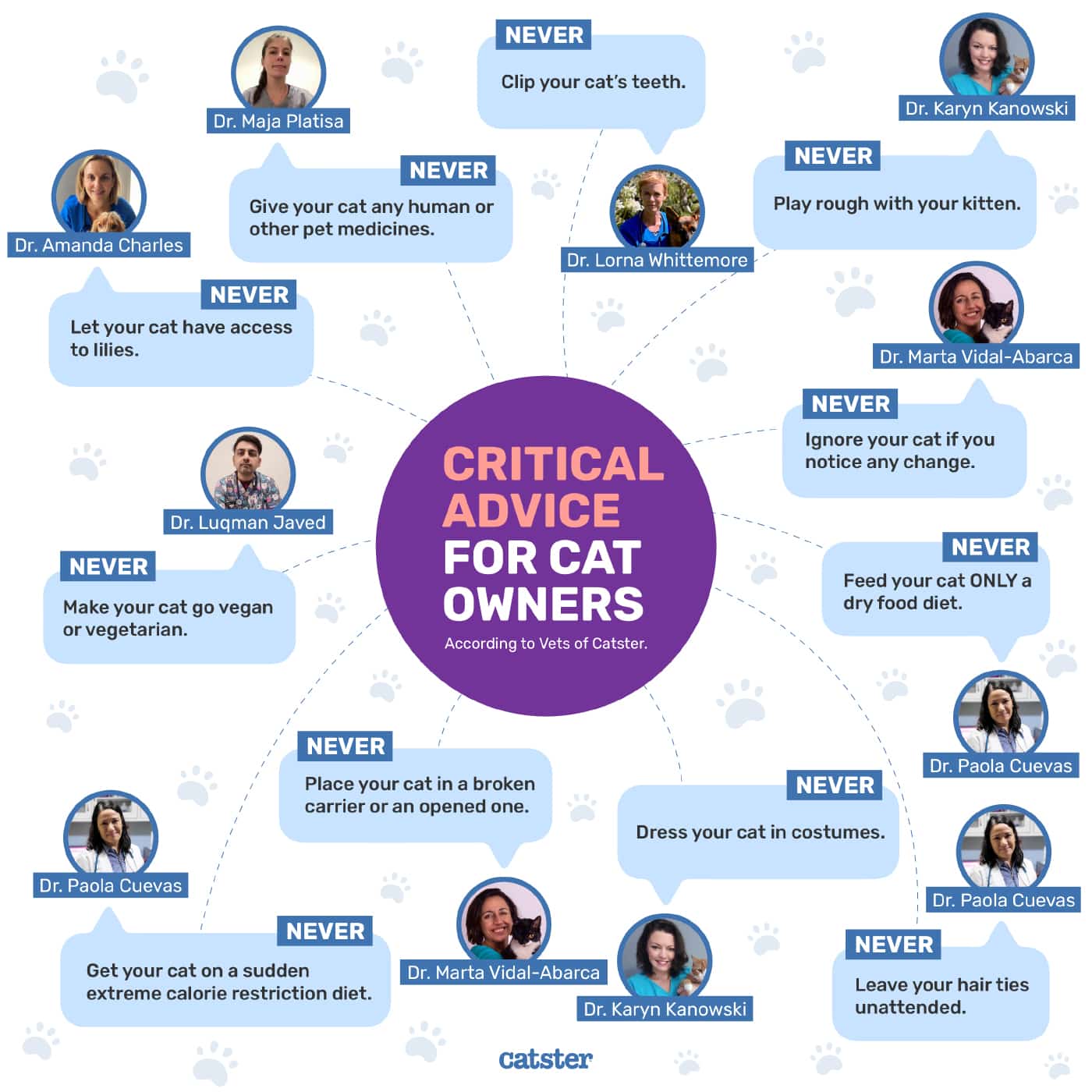
The 11 Senseless Cat Owner Sins With Safer Alternatives
1. NEVER give your cat any human or other pet medications.
Giving medicines not prescribed to your cat by your veterinarian can be dangerous and even deadly.
INSTEAD:
- Speak to your veterinarian if your cat is not well.
- Only use the medicines your vet prescribes for the cat’s particular health issue.
- Follow the dosage, frequency, and route of administration carefully.
- Maja Platisa, DVM MRCVS CertAVP
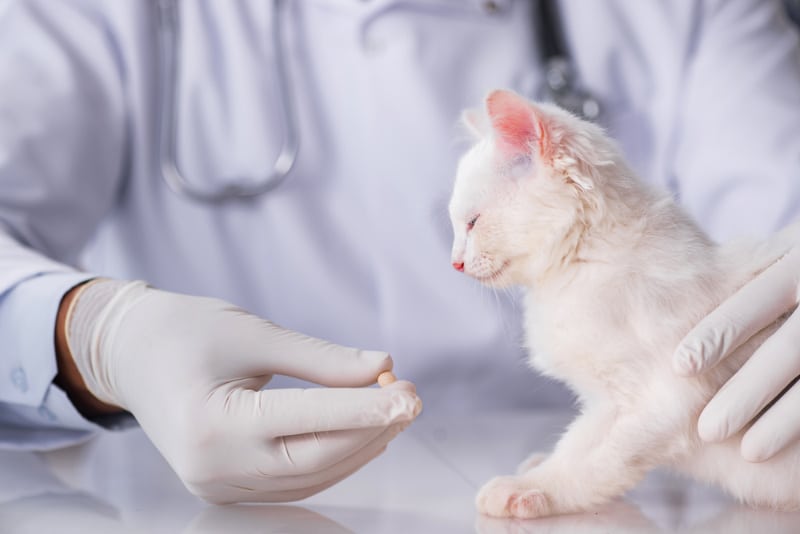
2. NEVER clip your cat’s teeth
Clipping a cat’s teeth is not the same as trimming their claws. Clipping teeth can cause permanent damage and be very painful for them.
INSTEAD:
- If you are concerned about your kitten’s teeth being misaligned, visit your veterinarian, who will assess their teeth and give professional advice and help.
- If your cat is biting, get a check-up with your vet to rule out health problems, and they can direct you to a qualified behaviorist.
- Lorna Whittemore, BVMS, MRCVS, GPcertFELP
3. NEVER let your cat have access to lilies
Lilies, among other plants, are toxic to cats. Cats are curious and might chew on this plant if you have it in your home.
INSTEAD:
- Research cat-safe plants and flowers to brighten up your home and garden.
- Know that all parts of lilies, including the pollen and vase water, are toxic to cats.
- Contact your vet immediately if your cat has eaten or come into contact with lilies.
- Amanda Charles, BVSc MRCVS GPcertDerm
4. NEVER make your cat go vegan or vegetarian
Realize that cats are obligate carnivores, and you must cater to their nutritional needs. Feeding them a vegan or vegetarian diet is unhealthy and puts their life at risk.
INSTEAD:
- Adopt a herbivorous pet if you’re keen on having a pet that follows such a dietary restriction.
- Contact your veterinarian for more information about your cat’s nutritional needs and acceptable foods for them.
5. NEVER play rough with your kitten
It might be cute when they’re little, but it teaches them that scratching and biting is okay. Plus, you are much larger than a kitten, so you could hurt them.
INSTEAD:
- Stock up on chaser toys, interactive toys, and wand-type toys.
- Two is better than one! Two kittens will get all their rough play, skirmishes, and mock fighting out of their system with each other, leaving cuddle time for you.
- If your cat starts to play rough with you, just get up and walk away.
- Karyn Kanowski, MRCVS, BVSc, BSc (Zoology)
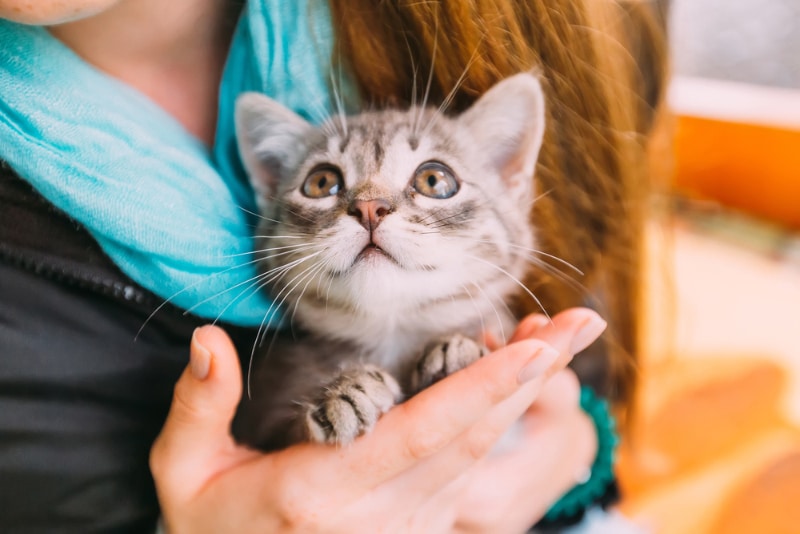
6. NEVER dress your cat in costumes
It might make a great photo, but with very few exceptions, they hate it and will resent you. Some costumes might be uncomfortable for them.
INSTEAD:
- Use Photoshop to add some flare to a photo.
- Create fun props and dioramas for them to play in and get naturally posed memories.
- Karyn Kanowski, MRCVS, BVSc, BSc (Zoology)
7. NEVER place your cat in a carrier you have not properly checked
The risk of your cat running away or getting lost is very high. This scenario would be a nightmare for both you and your cat.
INSTEAD:
- Before using the carrier, check that the zippers work and all locks are in place.
- Check that the lid and the base of the carrier fit properly.
- Purchase a carrier that is safe and fit for your cat.
- Marta Vidal-Abarca, BVSc MRCVS GPCertOphthal
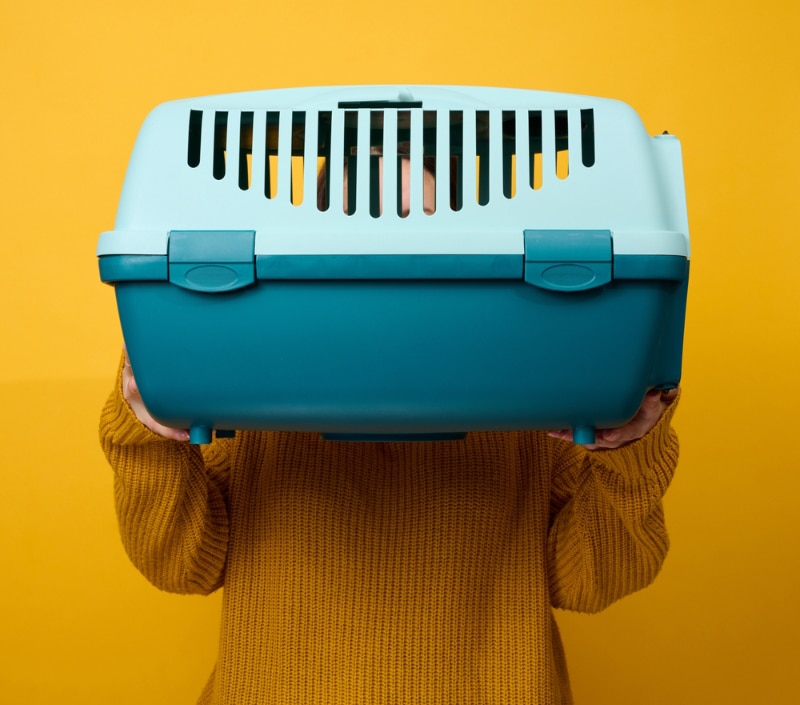
8. NEVER ignore your cat’s change in their urinating habits
No matter how subtle, changes in urination could mean health issues.
INSTEAD:
- Watch your cat closely if you notice any abnormality around their toileting behavior, such as not using the litter box at all, frequent trips to the litter box, spending more time than usual in their litter box, urinating small amounts, or vocalizing while urinating.
- Be familiar with your cat’s routine and know how they show signs of illness.
- Contact your veterinarian when you notice any changes in their toileting habits.
- Marta Vidal-Abarca, BVSc MRCVS GPCertOphthal
9. NEVER feed your cat ONLY dry food
Hydration is extremely important for cats, and an exclusively dry food diet does not offer enough moisture to help them be healthy.
INSTEAD:
- Offer your cat a moisture-rich diet, such as a complete and balanced fresh or wet food diet. If your cat prefers dry food, offer at least a 50/50 mix.
- Ensure your cat’s diet has enough proteins and moisture to mimic their natural food.
- Offer your cat a water fountain and think about creative ways to entice them to ingest enough water.
- Paola Cuevas, MVZ, Behaviorist
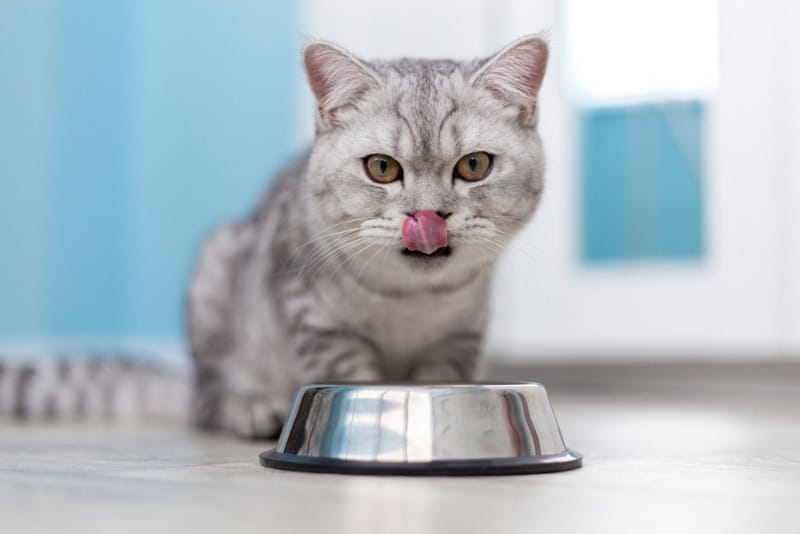
10. NEVER put your cat on a sudden extreme calorie-restricted diet
Restricting your cat’s caloric intake overnight can be very dangerous. Cats can develop hepatic lipidosis, known as fatty liver syndrome.
INSTEAD:
- If your cat needs to lose weight, start by reducing only 10% to 20% of their daily calorie intake. Weight in and recalculate every couple of weeks.
- A slow but consistent diet plan is preferred. Get your veterinarian involved.
- Feed a healthy, balanced diet and increase your cat’s physical activity with daily interactions.
- Paola Cuevas, MVZ, Behaviorist
11. NEVER leave your hair ties around the house
Ingestion of hair ties is a common occurrence in playful cats. Unaware cat owners usually only find out after emergency surgery.
INSTEAD:
- Keep your hair ties safe and away from the reach of your cats.
- If you buy a packet of hair ties, please only use one at a time so you do not leave it around the house where your cat can grab it.
- Never allow your cat to play with them or objects that are small and stringy, which they can ingest.
- Paola Cuevas, MVZ, Behaviorist
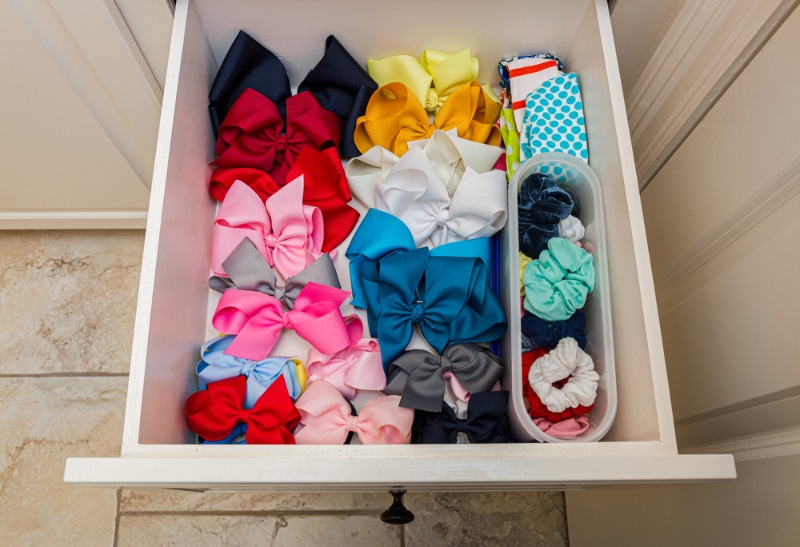
 Summing It All Up
Summing It All Up
Responsible pet owners never want to put their pets in danger intentionally. And some of these sins can seem harmless—but that is far from the truth. Our vet team hopes they have shed light on some practices that people might do to or with their pets, whether it involves their diet, safety around the home, or playing with them. Now that you know about these sins, you can take steps to avoid them.
Featured Image Credit: masary78, Shutterstock
Credit : Source Post

